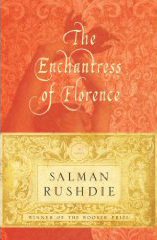I picked up The Enchantress of Florence because I was sad that Michael Chabon’s Gentlemen of the Road wasn’t longer; it seemed like a good idea at the time, but it was probably unfair to Salman Rushdie. I should have learned that lesson: this guy is not the last guy, and he never will be.
The Enchantress of Florence is a nested series of stories, starting with a man, Mogor dell’Amore, who hitches a ride with some pirates to the sultan’s court at Sikri. (“Murdered by pirates is good…”) Mogor tells the sultan how and why he came there, which involves many narrative side trips, and of course what goes on in the court is several stories’ worth, as well: the sultan’s disrespectful sons, his imaginary queen Jodhabai, and his growing obsession with the central figure in the stranger’s tale, black-eyed beauty Qara Köz. The atmosphere is richly textured with perfume, sand, and silk, and the magic is both subtle and powerful. It’s enough to set my freaking teeth on edge.
Here’s the problem: I know that Mogor is talking to an easily bored, casually violent, and highly sexed sultan who has already tried to have him trampled by elephants. Mogor is our Scheherazade, and, duh, hot babes make for a helpfully compelling narrative. I was annoyed, however, at the way every female character is only there for sex. I’m not exaggerating; every female character is a prostitute, a concubine, a courtesan, or someone’s extravagantly unfaithful wife:
The concubines had blended into a single supernatural Woman, a composite Concubine, and She was all around the two men, besieging them with love. The eunuch had slipped away outside the circle of the planets of desire. The single woman of many arms and infinite possibilities, the Concubine, silenced their tongues, her softness touching their hardness. Mogor gave himself up to her. He thought of other women far away and long ago, Simonetta Vespucci and Alessandra Fiorentina, and the woman whose story he had come to Sikri to tell. They were part of the Concubine, too.
This is coming from the third-person narrator, by the way, and not from within Mogor’s story to the sultan, which leads me to think that I’m actually annoyed at Salman Rushdie. This is the sandbox he wanted to play in, one where women exist to have sex, or, pardon the mangling, to be had sex with:
There is a weakness that comes over men at the battle’s end, when they become aware of the fragility of life, they clutch it to their bosoms like a crystal bowl they almost dropped, and the treasure of life scares away their courage. At such a time all men are cowards, and can think of noting but women’s embraces, nothing but the healing words only women can whisper, nothing but losing themselves in the fatal labyrinths of love.
And since every woman’s fatal labyrinth of love is pretty much the same, women are interchangeable, all part of that great Concubine whether they like it or not. I was tempted to joke that all the women in Enchantress like it, wink wink, nudge nudge, but there’s no question of their likes or dislikes. It’s nature, it’s fate, it’s the way women are.
The whole thing is so messily and uncomfortably Freudian. The caring mother-figure is collapsed with the object of sexual desire, and sex takes on the mother’s role of restoring comfort and order to the universe. Rushdie puts a lot of power into women’s laps, but it’s not power they can use. It’s all about Rushdie’s men seeking something; not to get in over my head, but it sounds a lot like the “myth of a primary experience of satisfaction [which] is an illusion to cover the fact that all satisfaction is marked by a loss in relation to a supposed initial, complete satisfaction.” To put it bluntly, the men in this book long for the simplicity and surety they imagine they had in the womb, so the obvious solution is to try and crawl back up there. It almost goes without saying that this book fails the Bechdel test.
There are many more examples of women as sexual objects—the memory palace, Jodha, the Skeleton and the Mattress—and I could go on, but I won’t; I just wanted to get a few quotes out there, along with enough commentary to feel that I’ve purged my bitterness at a book I wanted to like. But every time I felt myself getting drawn into the story, I was reminded that I, too, was a magical, mind-expanding, cosmic piece of ass. Gag me with a—well, with whatever you want, clearly.
Did anyone else read this? What did you think? I haven’t enjoyed Rushdie in the past, either, so it is just me?
Megan Messinger is a production assistant at Tor.com and she is now reading something else.










